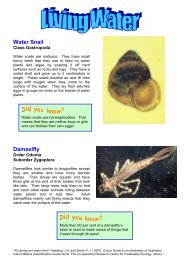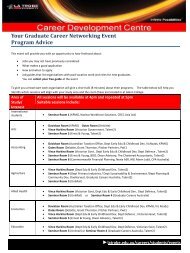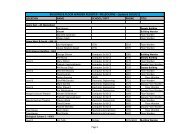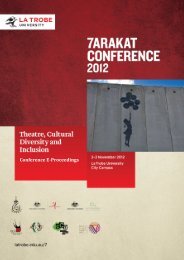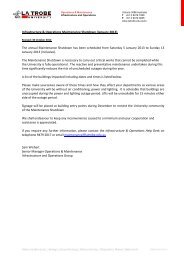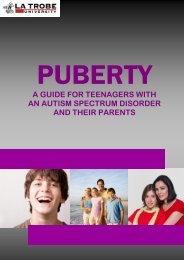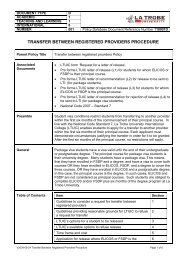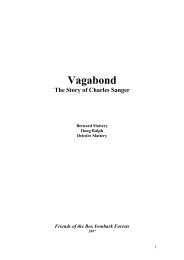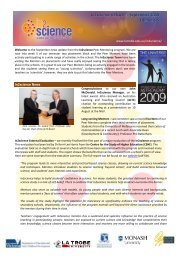Project Report - La Trobe University
Project Report - La Trobe University
Project Report - La Trobe University
You also want an ePaper? Increase the reach of your titles
YUMPU automatically turns print PDFs into web optimized ePapers that Google loves.
Friends first<br />
Probably the single most important factor is that<br />
we were friends with the Ichananaw first, and the<br />
friendships counted (and still count) for more than<br />
any aspect of our formal work. The project was<br />
only conceived in the context of trust and<br />
friendship, which was formed in turn through a<br />
series of visits to Chananaw. So we were friends<br />
with our Ichananaw project supervisor, and other<br />
key people with whom we worked, before the<br />
project began. This meant that there were no<br />
relationship issues or personality clashes to<br />
negotiate. And at a deeper level, our personal<br />
relationships established with the Ichananaw<br />
translated into long-term commitment to doing our<br />
very best by the community in terms of the project,<br />
always keeping in mind potential long-term<br />
implications of our actions.<br />
Respecting the community’s wishes<br />
We were doing something that was actually<br />
requested by the beneficiaries of our project. This<br />
was important to us in principle, but also had<br />
useful consequences in practice. We didn’t need to<br />
‘win’ the community over to get them involved –<br />
everyone we interacted with was enthusiastic to<br />
participate and all involvement was volunteered. It<br />
also meant that all aspects of the project were<br />
considered important by the community. In<br />
practical terms, we couldn’t have done anything<br />
without community support and participation: the<br />
Ichananaws’ involvement was essential to most<br />
aspects of our work on a daily basis. Also, during<br />
the course of the project, we allowed the<br />
community’s wishes and interests to direct our<br />
activities. For example, the development of the<br />
four-way dictionary came about largely in<br />
response to the strong community sentiment that<br />
it would be a useful resource not just for the school<br />
but for the entire community.<br />
Flexible about everything…<br />
We were flexible. Flexible about what we wanted<br />
to achieve (we adjusted our ‘wish list’ of project<br />
outputs many times, without worrying about not<br />
meeting any preconceived ideas of what we<br />
wanted to produce), flexible about our roles (we<br />
‘filled in’ for each other when necessary or<br />
convenient), flexible about our location (we moved<br />
between Chananaw, Manila and across the<br />
Cordilleras as needed), flexible about the resources<br />
available to us (we were prepared to make do<br />
without funding for publishing if the grant<br />
Indigenizing Education in a Kalinga Public School | 23<br />
To top off our project presentation and celebration in<br />
Chananaw on July 3, 2009, Maria sings a song she<br />
composed in Chinananaw to a common salidummay<br />
melody. The song tells of our time in Chananaw, our<br />
plans to return in a few years, and thanks the<br />
Ichananaw for the shared experience of the last five<br />
months. Good friend and supervisor Agom (Arlene)<br />
Dawing supports Maria by singing with her, while<br />
Edwin stands by for moral support.



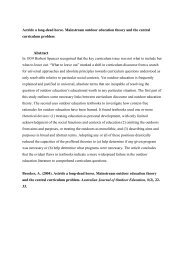
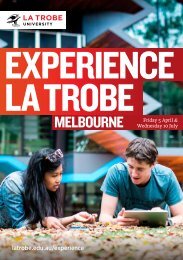
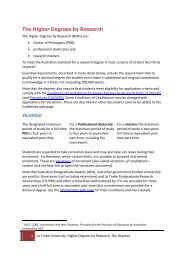
![Ottoman Empire course brochure [PDF 612KB] - La Trobe University](https://img.yumpu.com/12001562/1/184x260/ottoman-empire-course-brochure-pdf-612kb-la-trobe-university.jpg?quality=85)
![Getting Ready to Talk Manual [PDF 315KB] - La Trobe University](https://img.yumpu.com/11430807/1/190x245/getting-ready-to-talk-manual-pdf-315kb-la-trobe-university.jpg?quality=85)
